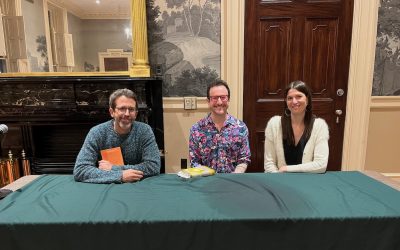Drew’s Center on Religion, Culture, and Conflict welcomed acclaimed author Carol Boston Weatherford
March 2022 – In celebration of Harriet Tubman’s 200th birthday, Drew University’s Center on Religion, Culture, and Conflict welcomed New York Times bestselling author Carole Boston Weatherford for a virtual discussion on Harriet Tubman and teaching difficult history to children.
Weatherford is a poet and author of over 50 children’s and young adult books. She has received a litany of literary awards, including three Caldecott Honors, two NAACP Image Awards, an SCBWI Golden Kite Award, and a Coretta Scott King Author Honor.
Jonathan Golden, director of the Center on Religion, Culture, and Conflict and assistant professor of religious studies and anthropology, moderated the event. The event signified the transition from Black History Month to Women’s History Month.
Weatherford read her Caldecott Honor Book, Moses: When Harriet Tubman Led Her People to Freedom, a historical fiction children’s picture book that emphasizes Harriet Tubman’s deep religious faith as she made her escape from slavery to freedom.
After the reading, Golden guided a powerful Q&A session and discussion on teaching racism to children.
How do you write about such difficult subjects as racism and equality, keeping in mind young children as your audience?
History is a story, and there are various lenses through which you can view history. I’m viewing history through a social justice lens but I’m presenting it as a story that will be palatable, comprehensible, and digestible for a relatively young audience. I know that I’m writing about tough topics, but I know that kids deserve the truth, demand the truth, and can handle the truth.
Is there a particular age that we can introduce racism to our young children?
I think that white people have the privilege of not talking to their children about racism. African Americans and other people of color have to talk to our children about it because we know that our children will be confronted with racism. I don’t think there’s any age that’s too young. Kids ask questions, and as parents and teachers, we need to know how to answer those questions. We may not be comfortable with it, but we must rise to the occasion.
When did you first learn of Harriet Tubman?
My elementary school was segregated and my teachers were very resourceful, teaching black history year-round. Harriet Tubman was one of the great heroes we learned about.
Tell us about your future projects.
I have a new book forthcoming, tentatively titled The Doll Test, which is about a test that psychologists Kenneth Clark and his wife Mamie Clark conducted during the segregation era to determine the psychological effect of segregation on African American children. They gave school children a Black doll and white doll to determine if the dolls produced negative or positive connotations. Invariably, the children had negative connotations surrounding the Black doll. This doll test was pivotal to Thurgood Marshall and his legal team during the Brown vs. The Board of Education case, which outlawed school segregation in 1954.




